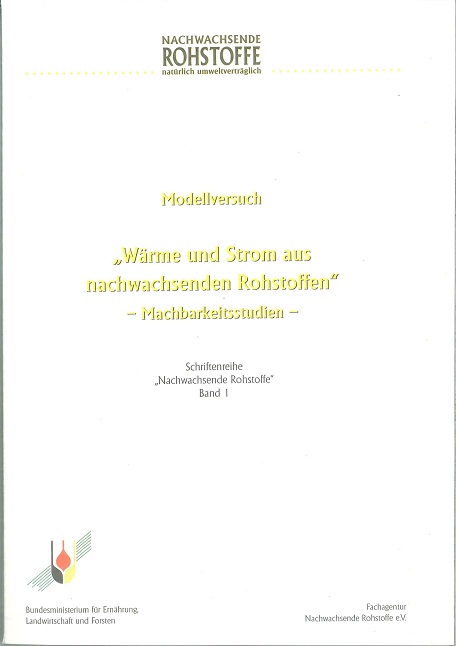Model experiment 'generation of heat and electricity from renewable resources'. An evaluation of 30 feasibility studies
- Project team:
Wintzer, Detlev (Project leader), Beate Fürniß, Sigrid Klein-Vielhauer, Ludwig Leible, Carl Leichsenring, Eberhard Nieke, Heinrich Tangen
- Funding:
Federal Ministry for Food, Agriculture and Forestry (BML)
- Start date:
1993
- End date:
1994
- Research group:
Sustainability and environment; Energy – resources, technologies, systems
Project description
In this project we carried out the scientific evaluation – from technical, economic, and ecological points of view – of the 30 feasibility studies that had been submitted to the BML for funding in the context of a model experiment. In terms of its contents, this work is closely related to the technology assessment study of the topic "renewable resources". The analysis was concluded with its publication in book form in 1994.
The 30 feasibility studies from different Federal States that were selected or put on a short list for the desired demonstration projects include some 20 types of technology for generating heat and/or electricity. Some of these technologies utilize quite different types of plant-derived energy carriers in the form of wood chips, chaff, bales, pellets, silage-based biofuels, or oil. The types of biomass or of plants that are envisaged for this purpose were span wood, straw, various types of grain, corn, Jerusalem artichokes, hay, and Chinese grass (miscanthus).
With regard to the state of technological development, the assessments revealed that – with the exception of the combustion of dry wood – there is still much research, development, and demonstration to accomplish in order to be able to find a suitable combination of solid plant-derived energy carriers on the one hand and combustion technologies on the other. At the time the study was compiled, it was not yet possible to say that it was state of the art that the plant-based energy carriers named above could be used to generate heat and electricity at low emissions (even at partial load) and that this could be energetically effective, reliable, and possible without the technological effort being too high.
Analysis of the feasibility studies further showed that it is by no means clear for all types of plants to what extent drying, storage, compaction, or comminution of the biomass is required and how these processing steps can be sensibly carried out.
The assessments from an economic perspective concerned the substitution value (the feasible price for the biofuels employed) of the facilities for generating heat and/or electricity, the costs for making the biofuels freely available at the facilities, and the remaining gap in cost coverage that results (need for a subsidy).
Concerning the substitution value, quantitative pattern analyses were conducted on the important characteristic data that determine the substitution value: attainable income from heat and electricity, specific investments, workload, and specific operating costs. The large range in the costs for making biofuels available (from practically free of charge to approximately 80 DM/MWh) was analyzed to determine the reasons. These are not just to be found in the different types of plants, but also in the different types of conditioning, in the regional, natural, and economic factors, and in the different methodological approaches of the feasibility studies.
Selected publication
Wintzer, D.; Fürniß, B.; Klein-Vielhauer, S.; Leible, L.; Leichsenring, C.; Nieke, E.; Tangen, H.
Modellversuch "Wärme und Strom aus nachwachsenden Rohstoffen" - Machbarkeitsstudien -. BML/FNR (Hrsg.). Münster: Landwirtschaftsverlag 1994
(Schriftenreihe "Nachwachsende Rohstoffe", Bd. 1)
Titelbild/jpg Volltext/pdf
Publications
Modellversuch "Wärme-, Stromerzeugung aus nachwachsenden Rohstoffen": Auswertung von 30 Machbarkeitsstudien
1994. Kernforschungszentrum Karlsruhe (KfK)
Energetische Nutzung der Biomasse - Ergebnisse aus einer Technikfolgenabschätzung und aus der Auswertung von Machbarkeitsstudien
1994. Saarbrücker Kreis Energiewirtschaft, Universität Saarbrücken (1994), Saarbrücken, Germany, June 13, 1994


